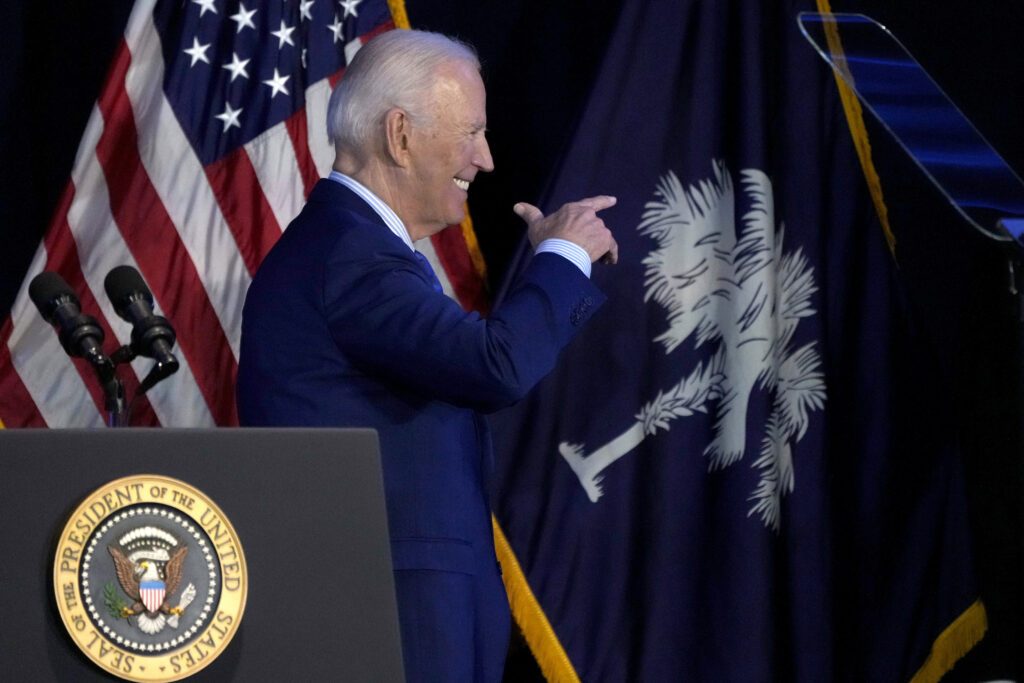
South Carolina commences President Joe Biden’s reelection effort in earnest on Feb. 3 with the first sanctioned Democratic primary. The contest, which he is all but sure to win, will be the first time in 2024 Biden will be on the ballot. As such, the state presents an opportunity to examine the electability of the incumbent president, who has been plagued by low approval ratings across multiple measures and groups. Part Two of “Biden on the Ballot” looks at Biden’s record on immigration and how it will come into play during the first-in-the-nation primary for Democrats.
President Joe Biden is set to face his first real challenge of the 2024 cycle as the surge in illegal immigration at the southern border threatens to overshadow his campaign in South Carolina later this week.
Democrats will hold their official opening primary election of the presidential cycle this weekend, putting Biden’s name on the ballot for the first time this year in South Carolina. Although the president is expected to win by huge margins, his victory could be shrouded by border negotiations playing out in the nation’s capital and impeachment proceedings against Homeland Security Secretary Alejandro Mayorkas amid record-high immigration under the Biden administration.
The impending impeachment vote targeting Mayorkas seeks to charge the top Biden administration official with failure to uphold the law and a breach of public trust. The House is set to vote on those charges as early as next month.
If impeached, Mayorkas would be the first Cabinet member to be charged with high crimes and misdemeanors since 1876. It would also provide Republicans with campaign fodder to use against Biden as they seek to take control of the White House in November.
Sen. Lindsey Graham (R-SC) predicted immigration would be “one of many” issues that will play a role in his home state of South Carolina as well as on the national stage.

“Biden doesn’t have a snowball’s chance in hell in South Carolina,” Graham said. Nationally, “I think immigration is going to hurt President Biden. I think he’s screwed it up and it’s been a nightmare. He’s lost control.”
The border has become a top concern in recent months, overtaking inflation and the economy, according to a recent Harvard CAPS-Harris poll. Roughly 35% of voters listed immigration as their top concern, with inflation coming in at 32%.
Immigration has also shown itself to be a top policy issue for primary voters, according to exit polls in Iowa and New Hampshire, spelling trouble for Democrats as they have repeatedly polled worse on the issue compared to Republicans. Biden has sought to change his tune on the border in recent days, taking on a more aggressive approach as the issue emerges as a top voter priority in the 2024 elections.
During a campaign stop in Columbia, South Carolina, over the weekend, Biden vowed to “shut down the border” right away if a bill passes through Congress giving him the power to do so.
“A bipartisan bill would be good for America and help fix our broken immigration system and allow speedy access for those who deserve to be here, and Congress needs to get it done,” Biden said, referring to ongoing negotiations in the Senate for a border reform bill. “It’ll also give me, as president, the emergency authority to shut down the border until it could get back under control. If that bill were the law today, I’d shut down the border right now and fix it quickly.”
However, it’s not entirely clear what a border shutdown would look like under the bipartisan Senate deal or how it would differ from policies implemented under the Trump administration.
When pressed for details, the White House said the plan would provide new enforcement tools and policy changes that would allow Biden to “shut down the border.”
“The new enforcement tools that do not currently exist, that will be part of this bipartisan agreement … there are different definitions of what that looks like, of what actually shutting down the border looks like,” said White House press secretary Karine Jean-Pierre. “What the president wants to see is that we deal with the challenges at the border [and] that we have an opportunity to deal with what’s going on … and make sure that we have the funding and the resources to deal with what we’re seeing at the border.”
Democratic strategist Brad Bannon doesn’t foresee immigration playing much of a role in 2024’s nominating contests, instead saying the issue will have a bigger role to play after Republicans choose their nominee to face Biden on the ballot in November.
“I think it will be a big deal in November for two reasons: One is Trump will use it to galvanize turnout,” Bannon said. “[Second,] I think generally it might have an effect in states like Georgia and Arizona, which are in play in the fall.”
Increased voter turnout due to immigration could come back to haunt Biden, especially as some immigrant advocates, including the American Civil Liberties Union, have already come out against the framework being negotiated in the Senate as “callous” and “unworkable,” possibly threatening key support the president will need in November.
Former President Donald Trump has also come out against the framework, prompting some of his allies on Capitol Hill to challenge the legislation before it’s even finalized and deem it dead on arrival in the House.
“The border crisis … could be solved tomorrow by Joe Biden and the Democrats. They do not want a solution,” said Sen. Ted Cruz (R-TX). “And so I don’t believe Democrats are negotiating in good faith. Nobody knows exactly what’s in this deal because they won’t release text. But there’s a reason for that. The reason you don’t release text is when the substance is so bad that the American people would hate it if they knew what was in it.”
But much of Biden’s defense could hinge on the Senate border deal being bipartisan, especially with Sens. Chris Murphy (D-CT), Kyrsten Sinema (I-AZ), and James Lankford (R-OK) as the top negotiators. Bannon said that even if negotiations fall flat, they could help Biden’s case anyway.
“If you look at swing voters in the battleground states, if the Republicans block passage of this compromise bill, I think they could be swayed by Biden’s arguments that ‘Hey, listen, I tried to fix this … but the Republicans punted both times when we had an opportunity to solve the problem,” Bannon said. “And I think that’s an argument that could have a positive impact for Biden among swing voters in the battleground states.’”
Democrats are already throwing attacks at Republicans along those lines, claiming the GOP is refusing to act on the border to boost Trump’s reelection prospects.
CLICK HERE TO READ MORE FROM THE WASHINGTON EXAMINER
“From the beginning, we’ve always known there would be a group of Republicans, including Donald Trump, that didn’t want to fix the border,” said Murphy, one of the lead negotiators of the Senate border deal. “A lot of Republicans have become used to this being just merely a political issue, not an actual policy problem. And that’s hard for them to get over.”
More than 371,000 non-U.S. citizens were stopped when they attempted to enter the United States last month, including those who walked across without permission, lacked proper documents to pass through ports of entry, or were paroled in from abroad, according to U.S. Customs and Border Protection data released Friday evening. The previous record of 341,392 was set in August 2023.







